In this BookNotes I’m going to tell you about a book that we think you should pre-order, a book that is coming mid-October, and is one of the most interesting, unique, and I’d say important books of the year. Some of us have been wanting something like this for years now, and it is finally (almost) here. And it is truly extraordinary, very illuminating, a great read.
I’m inviting you to order the forthcoming biography of Walter Brueggemann penned by central Pennsylvanian, Conrad Kanagy. I’ve read the early version and I’m a huge fan. I’ll tell you a bit about it so you can determine if it is something you want (or something you want a bunch of to give away or to use for a book club.) It’s a good one.
After my review of the forthcoming bio, I’ll post tomorrow a big “reader’s guide” to some of the essential Brueggemann books and suggest a few of my own favs. He’s written up towards 100 books — some tour de force groundbreaking volumes, others nice collections of essays or sermons or prayers — so I can’t list them all. We have almost everything that is currently in print.
But first, the forthcoming biography. Then, tomorrow, the big list. You can find your way to the bottom of this column and click on that order link to enter credit card info. Thanks.
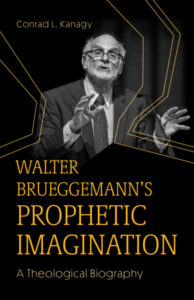 Walter Brueggemann’s Prophetic Imagination: A Theological Biography Conrad L. Kanagy (Fortress Press) $24.95 OUR 20% OFF SALE PRICE = $19.96 not yet released – due mid-October 2024
Walter Brueggemann’s Prophetic Imagination: A Theological Biography Conrad L. Kanagy (Fortress Press) $24.95 OUR 20% OFF SALE PRICE = $19.96 not yet released – due mid-October 2024
Conrad L. Kanagy is a well-respected Mennonite pastor, leader, and author who is also a sociologist, and professor of sociology at Elizabethtown College here in central PA. That he discovered Brueggemann long after Brueggemann had been publishing gives him the enthusiasm of a recent convert to this giant in the field of Biblical studies. Kanagy did a deep dive into some of Brueggemann’s books (including on Jeremiah, which were seminal) and, of course, the classic — arguably one of the most important books in Biblical scholarship in the last 100 years — The Prophetic Imagination. He used Brueggemann’s book in his own work evaluating various concerns in his own denomination and realized some resonance; Brueggemann, undisputedly a leader in the guild of Biblical scholarship, is, at heart, what we used to call a churchman. He loves the local church and spent a career training pastors. He did this, though, as Kanagy’s forthcoming biography shows, by reading widely across the disciplines, but especially in the social sciences. He was a sociology major in college, before going to Eden Seminary in the 1950s. Kanagy, in his discovery, was coming to know a soul mate.
As Kanagy tells it in this fabulously readable, even artfully crafted, narrative, he understood that Brueggemann was influential in the guild; his remarkable gift and passion was for drawing critical scholars away from dry speculations and tediously detailed literary studies to energetic and generously interpretive exegesis for the sake of hearing the voice of the God behind the Biblical text. He has brought this nearly evangelical passion to his field, offering what I might cheaply call a third way between near dismissal of the text in liberal camps and fundamentalist literalism on the other hand. Besides exceedingly academic work offering this fresh articulation for Biblical studies in the guild, Brueggemann has also been powerfully influential in the mainline church (and, in greater or lesser degrees) within the evangelical movement as well. Both camps have had their beefs with him, and yet he is the closest thing to a Old Testament Biblical studies rock star we’ve got, only somewhat analogous, I’d say, to N.T. Wright in the New Testament world.
Kanagy wanted to know this important, if controversial, figure and determined to do a series of interviews (mostly over Zoom) to let Walter tell his story. This “theological biography” is the thrilling result.
Again, there were a few things that seemed to draw Kanagy to this project, besides his own genuine appreciation for the books and articles by Brueggemann and Walter obviously being influenced by sociologists, from Emile Durkheim to Karl Marx to Peter Berger.
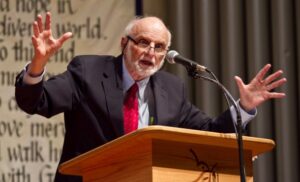 As the story develops we see that Brueggemann made some hard (if, in retrospect, understandable) choices of not being a pure academician, not working solely in the high-octane world of the theological academy, but by teaching in seminaries designed to serve those heading into the ministry. (We learn that at one point, mid-career, Walter turned down a prestigious job offer to teach at a fancy-pants divinity school.) Walter’s famously tireless commitment to the church, shown in his doing workshops for congregations, preaching around, for serving many denominations, was apparently appealing to the Mennonite Kanagy. Had Walter just been another esteemed but arcane Biblical scholar with a few heady books under his belt my sense is that he would not be as well known or as well loved as he is. Kanagy’s book portrays Brueggemann as a church guy, who — despite some famous leadership in scholarly circles, seminal lectures known the world over, and controversies caused at the Society for Biblical Literature, say — mostly taught preachers to wrestle with the Bible with and for their congregations.
As the story develops we see that Brueggemann made some hard (if, in retrospect, understandable) choices of not being a pure academician, not working solely in the high-octane world of the theological academy, but by teaching in seminaries designed to serve those heading into the ministry. (We learn that at one point, mid-career, Walter turned down a prestigious job offer to teach at a fancy-pants divinity school.) Walter’s famously tireless commitment to the church, shown in his doing workshops for congregations, preaching around, for serving many denominations, was apparently appealing to the Mennonite Kanagy. Had Walter just been another esteemed but arcane Biblical scholar with a few heady books under his belt my sense is that he would not be as well known or as well loved as he is. Kanagy’s book portrays Brueggemann as a church guy, who — despite some famous leadership in scholarly circles, seminal lectures known the world over, and controversies caused at the Society for Biblical Literature, say — mostly taught preachers to wrestle with the Bible with and for their congregations.
(I have been to events with Brueggemann and I could tell some lovely stories of his passion and zeal and humor and special attention given to me, the lowly guest bookseller at congregational gigs or denominational retreats. I’ve been with him at a Bread for the World banquet and at more than one central PA church. I’ve been with him as he lectured with UCC clergy, with Epsiopalian congregants, with Presbyterian folk. The first time I heard him in the early 1980s I had snuck into the State Pastor’s Conference with a pastor friend’s name tag; Moltmann was there, too, but Brueggemann blew me away. I almost had those cassette tapes memorized. Always he is passionate about the Word of God but aware of the world of mainline church life as he would speak to small groups of working pastors or interested lay folk. I always came away struck by how someone of such scholarly influence and prestige would show up in Harrisburg or Lancaster or a bland Philly suburb. His service to God’s people is as striking as it is extraordinary.)
Yet, he served as President of the SBL (Society of Biblical Literature) and has friends (and a few critics) within the scholarly guild. By knowing the critical theories so well (and assuming what some evangelicals might think is too much from that liberal tradition) and being grounded 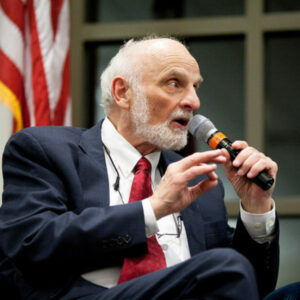 in the best of mainline/ecumenical studies of the last century — he studied at Union with the famous James Muilenburg and was profoundly influenced by Von Rad and Brevard Childs and Norman Gottwald and knows everybody doing critical scholarship — he had a certain gravitas among those doing that sort of work, thereby (as I might put it) earning the right to be heard. With a near photographic memory and massive capacity for reading the critical literature, he could call those in that tradition to repent of Enlightenment-based sorts of rationality, epistemologies of hubris and certainty, and to implore them to move towards the realities of a faith-based submission to the deepest questions offered by the Biblical texts. Again, that he would draw on the likes of Paul Ricoeur, was deft and impressive.
in the best of mainline/ecumenical studies of the last century — he studied at Union with the famous James Muilenburg and was profoundly influenced by Von Rad and Brevard Childs and Norman Gottwald and knows everybody doing critical scholarship — he had a certain gravitas among those doing that sort of work, thereby (as I might put it) earning the right to be heard. With a near photographic memory and massive capacity for reading the critical literature, he could call those in that tradition to repent of Enlightenment-based sorts of rationality, epistemologies of hubris and certainty, and to implore them to move towards the realities of a faith-based submission to the deepest questions offered by the Biblical texts. Again, that he would draw on the likes of Paul Ricoeur, was deft and impressive.
Kanagy comes back to this often, this both/and capacity of Brueggemann to speak the language of the most modernist scholar (and, eventually, the postmodernist ones, too) even as he pushed through their dead-ends and cul-de-sacs and invited them to a more robust, wholistic, lived, encounter with the God behind the texts. Kanagy makes much of this and it brought, at least to this reader, more sympathy and gratitude for the price Brueggemann has paid within the scholarly community of mainline Protestant, Catholic, and Jewish scholars. Kanagy reports a few examples of this tension, and the tension it brought; for instance, he describes in detail a Christian Century review of three needlessly critical/arcane commentaries on Jeremiah that Brueggemann lambasted, indicating the uselessness of such hermeneutical dead-ends.
He also cites — fair enough — a very critical speech given (which was included in a chapter in God in the Fray, a festschrift in Brueggemann’s honor) by Walter’s friend Terry Fretheim, who took Walter to task for failing in any number of scholarly details and holding too many theological ambiguities. Later, Brueggemann spoke highly of Fretheim as their theological disagreements (and Fretheim’s public critique) were less important than their friendship and mutual respect. Kanagy’s Walter Brueggemann’s Prophetic Imagination is loaded with this kind of fascinating stuff about his life and the balancing of aspects of his thinking and his ministry, his ever-evolving scholarly work and his public offerings.
Walter Brueggemann’s Prophetic Imagination not only shows in passionate detail some of the battles of Brueggemann’s career as Bible scholar to the churches, but how he routinely pushed towards a generative and socially disruptive vision, the “prophetic imagination” of that 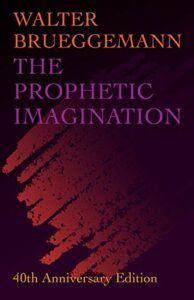 seminal 1978 book. (And, who knew that somehow the editors who helped name that stunning work drew on a line from Flannery O’Connor?) This radical vision of how the prophets came to imagine that things could be otherwise — filled with pathos and daring to confront the cultural accommodation of God’s people (whether Moses or Jeremiah or Jesus) — was, in so many ways, imparted, nearly imputed, by Brueggemann to his students and listeners. It is no surprise that his poetic passion for imagining new social policy that emerges from the texts of Scripture — and, man, Brueggemann shows that nearly any passage has public implications! — ends up influencing Christian peace and justice activists in the streets; there is a section in Kanagy’s book about Walter’s many articles published in Sojourners and about his friendship with Jim Wallis.
seminal 1978 book. (And, who knew that somehow the editors who helped name that stunning work drew on a line from Flannery O’Connor?) This radical vision of how the prophets came to imagine that things could be otherwise — filled with pathos and daring to confront the cultural accommodation of God’s people (whether Moses or Jeremiah or Jesus) — was, in so many ways, imparted, nearly imputed, by Brueggemann to his students and listeners. It is no surprise that his poetic passion for imagining new social policy that emerges from the texts of Scripture — and, man, Brueggemann shows that nearly any passage has public implications! — ends up influencing Christian peace and justice activists in the streets; there is a section in Kanagy’s book about Walter’s many articles published in Sojourners and about his friendship with Jim Wallis.
Back when I was much younger and a bit more impudent, I once gently chided Walter for not getting arrested in gestures of civil disobedience; it seems that his Biblical and prophetic directives sure would have compelled that kind of public resistance. But, still, his courage and assistance to those on the picket line, in the soup kitchens and free medical clinics and advocating for immigrants and others marginalized by church and state has been consistent and healing ballast for those in the struggle. I wish Kanagy might have explored some of the public stuff Brueggemann did do, speaking at protests or preaching on the streets or joining those doing mission projects. There is no reference to friendship with Dan or Phil Berrigan, say, although Walter appreciated their mutual mentor, Abraham Heschel.
The book does explore, and Kanagy does speak, however, about another aspect of Brueggemann’s life which, as a biographer, he had to investigate; let’s give it that generic name of his background; his family of origin. There are no awful stories there, other than the impact of Walter having grown up rural and poor, with a relatively uneducated father who became an innovative and respected small town pastor. (Respected by some, that is; there is a terrible story of a snooty Missouri Synod Herr Doktor pastor who would not even shake Brueggemann’s father’s hand, humiliating him deeply.) Walter’s mother was demanding and those who have heard Brueggemann speak candidly, as he does in workshops and retreats, may have heard him speak of having been in therapy some of his adult life. He has studied Freud and others, trying to figure out the vexed relationship with his loving, good, German family. Kanagy is never inappropriate and there are no hidden secrets revealed, but a few key moments in his upbringing come up, over and over, actually. It’s revealing, instructive, and, again, garners more sympathy for Walter as he admits to ongoing puzzlement about his family of origin and the pietism of his immigrant denomination and the faith in which he was brought up.
Speaking of which, he was, as most know, part of a stream of gentle, German Reformed Calvinists that merged with another such tributary, who then merged with New England congregationalists to form the United Church of Christ (UCC.) I wish Kanagy might have mentioned a bit more about this historic merger and if Brueggemann was involved; his first books were on the UCC press, I believe, including his famous Living Into a Vision which was reissued years later as Peace.) Walter’s first seminary job — he was a farm hand as a kid — was at his father’s old seminary, Eden, founded in 1850 near Saint Louis, which, years before Walter arrived, had one of the Niehbur brothers as dean (and the other on the Board.) Brueggemann’s own interest in weaving together insights from sociology with Biblical theology was affirmed there, even as he became a young dean, himself, appreciated greatly by nearly everyone there.
And so, Walter Brueggemann’s Prophetic Imagination: A Theological Biography is just that — a personal biography, yes, but with a special view to Brueggemann’s ongoing theological development, in light of his speciality, the exegesis of the texts of the Bible which he knows so well. (To be clear, he is not trained officially in theology proper, but is a Bible scholar, not a theologian as such.) By speaking in such lively terms about the possibility of knowing the God of the Bible and actually caring about communities of faith that pray and sing hymns and baptize babies and serve the poor and do what ordinary churches do, he lives his life at the intersection of Biblical studies and congregational life.
As an older gentleman, now, (he was born in 1933 so you do the math) his conversations with Kanagy were winsome and wistful, energetic at times, honest, even painful. But, mostly, the interviews reflect on Brueggemann’s own sense of the call to study and grapple with and proclaim the good news of God’s promised regime change, the reign of God breaking into human history, most clearly in the life, death, and resurrection of Jesus the Christ. His lifetime spent upsetting the arcane, critical worlds of (nearly) unbelieving Biblical scholarship as well as the co-opted, captive churches (left, right, or center), made for a hard but dramatic life. Kanagy raises so much, reports back from the interviews with elan and appreciation, and sometimes digresses to show how Brueggemann connects the dots between the Bible and our emerging postmodern times.
Kanagy’s voice is the present one in the book, but the topic comes alive. Those who have met Brueggemann will appreciate this so much, hearing him in these stories and reflections and those who have not will come to a better appreciation of the man and his work.
One other little part of the book that makes it especially enjoyable: Kanagy brings in four or five “conversation partners” as he tells how they were profoundly influenced by Walter’s teaching, friendship, and guidance. New hope was found, new directions discerned, and younger scholars and pastors tell of their own encounters with Brueggemann as teacher and mentor. One was literally suicidal and reading Brueggemann’s The Land: Place as Gift, Promise, and Challenge in Biblical Faith (the first book I ever read of his in maybe 1980) and then hearing him preach saved his life!
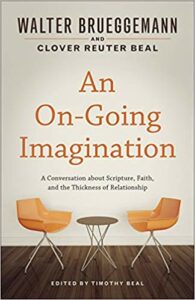
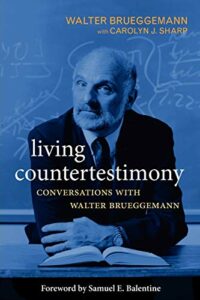 A few of these names will be known by those who follow Brueggemann’s publishing career as they have gone on to write books with him, such as Clover Reuter Beal, who published a book called An On-Going Imagination: Conversations About Scripture, Faith, and the Thickness of Relationships (WJK; $18.00 – OUR SALE PRICE = $14.40) and Carolyn Sharp, who teaches a course at Yale Divinity School on Brueggemann, who has given us Living Countertestimony: Conversations with Walter Brueggemann (WJK; $20.00 – OUR SALE PRICE = $1`6.00) as well as her excellent guide to Brueggemann’s work, Disruptive Grace: Reflections on God, Scripture, and the Church which, although mostly an anthology of Brueggemann’s best work up to that time, was curated and introduced helpfully by Sharp. (Fortress; $35.00 – OUR SALE PRICE = $28.00.) These fine folks who discovered Walter’s influence as young scholars, pastors, or activists, and their testimony about his generative role in their lives, is fascinating.
A few of these names will be known by those who follow Brueggemann’s publishing career as they have gone on to write books with him, such as Clover Reuter Beal, who published a book called An On-Going Imagination: Conversations About Scripture, Faith, and the Thickness of Relationships (WJK; $18.00 – OUR SALE PRICE = $14.40) and Carolyn Sharp, who teaches a course at Yale Divinity School on Brueggemann, who has given us Living Countertestimony: Conversations with Walter Brueggemann (WJK; $20.00 – OUR SALE PRICE = $1`6.00) as well as her excellent guide to Brueggemann’s work, Disruptive Grace: Reflections on God, Scripture, and the Church which, although mostly an anthology of Brueggemann’s best work up to that time, was curated and introduced helpfully by Sharp. (Fortress; $35.00 – OUR SALE PRICE = $28.00.) These fine folks who discovered Walter’s influence as young scholars, pastors, or activists, and their testimony about his generative role in their lives, is fascinating.
 I think Walter Brueggemann’s Prophetic Imagination is a book that will be enjoyed by anyone who has appreciated his work and, I think, will be important for those who are seriously engaging with his core theories and visions. If you hunger to know more about how the Bible relates to modern life, this isn’t a programmatic guide, but it is a glimpse to the most important Biblical scholar doing that kind work yet today.
I think Walter Brueggemann’s Prophetic Imagination is a book that will be enjoyed by anyone who has appreciated his work and, I think, will be important for those who are seriously engaging with his core theories and visions. If you hunger to know more about how the Bible relates to modern life, this isn’t a programmatic guide, but it is a glimpse to the most important Biblical scholar doing that kind work yet today.
We very highly recommend this fascinating biography to those serious about studying Biblical texts, their rhetoric, and their subsequent evocative power to shape our imaginations or to those who just want to learn about the life, background, passions, and career of this exceptionally popular Christian scholar.
Here we see biblical scholarship embedded in a contemporary life of struggle, conviction, commitment, and prayer. For preachers, teachers, scholars, readers who cannot leave the Bible alone because God won’t leave them alone, this book helps us make sense of our experience and our sense of what is still possible with God. — Ellen F. Davis, Professor of Bible and Practical Theology, Duke Divinity School, author of Biblical Prophecy: Perspectives for Christian Theology, Discipleship, and Ministry
Walter Brueggemann is the clearest biblical prophet of our time. He is not just a magnificent scholar of the prophets or their best theological interpreter, but Brueggemann himself is a prophet to and for our troublesome days. Walter would be the first to deny such accolades. And this is why Conrad Kanagy’s theological biography is so needed. Kanagy, in rich and critical detail, documents what Brueggemann has seen and heard, studied and learned, reflected upon and then preached and written. This book reveals what it looks like to speak the Word of God’s truth to power in the face of all our ideological manifestations of falsehood. As with the prophets, justice is his measure and the marginalized are his focus. Yet, as Kanagy shows, Walter is a kind man who walks humbly with his God. –Jim Wallis, founding editor, Sojourners, Director of the Center on Faith and Justice at Georgetown University, author of Christ in Crisis? Reclaiming Jesus in a Time of Fear, Hate, and Violence
I can think of no biblical scholar more worthy of a biography than Walter Brueggemann, the most gifted, insightful, and prolific scholar the field of Old Testament studies has ever seen. Conrad Kanagy has provided us with just that in a volume that is equal parts biography of Brueggemann, an account of his career, and reflection on his breakthrough book, The Prophetic Imagination — all written in an engaging, lively style. Kanagy’s treatment consistently delivers profound insights into all three of these things (and their remarkable interrelations) and is especially noteworthy in its attention to Brueggemann’s early years: how formative his family of origin, his upbringing, and his pre-professorial days were to all that followed. Even if you know Walter and his work well — or just think you do — be prepared to learn an immense amount in this book, which left me yet again awed and inspired by one whom I deem no less than a modern-day prophet. — Brent A. Strawn, Professor of Old Testament; Professor of Law, Duke University, author Lies My Preacher Told Me: An Honest Look at the Old Testament
+++
TO PLACE AN ORDER
PLEASE READ, THEN SCROLL DOWN AND CLICK ON THE “ORDER HERE” LINK BELOW.
It is helpful if you tell us how you want us to ship your orders.And if you are doing a pre-order, tell us if you want us to hold other books until the pre-order comes, or send some now, and others later… we’re eager to serve you in a way that you prefer.
The weight and destination of your package varies but you can use this as a quick, general guide:
There are generally two kinds of US Mail options and, of course, UPS. If necessary, we can do overnight and other expedited methods, too. Just ask.
- United States Postal Service has the option called “Media Mail” which is cheapest but can be a little slower. For one typical book, usually, it’s $4.12; 2 lbs would be $4.87. This is the cheapest method available.
- United States Postal Service has another, quicker option called “Priority Mail” which is $8.50, if it fits in a flat-rate envelope. Many children’s books and some Bibles are oversized so that might take the next size up which is $9.20. “Priority Mail” gets much more attention than does “Media Mail” and is often just a few days to anywhere in the US.
- UPS Ground is reliable but varies by weight and distance and may take longer than USPS. Sometimes they are cheaper that Priority. We’re happy to figure out your options for you once we know what you want.
If you just want to say “cheapest” that is fine. If you are eager and don’t want the slowest method, do say so. It really helps us serve you well so let us know.
PRE-ORDER TODAY
SHIPPING BEFORE OCTOBER 24, 2023
20% OFF

BookNotes
SPECIAL
DISCOUNT
20% OFF
ALL BOOKS MENTIONED
+++
order here
this takes you to the secure Hearts & Minds order form page
just tell us what you want to order
inquire here
if you have questions or need more information
just ask us what you want to know
Hearts & Minds 234 East Main Street Dallastown PA 17313
read@heartsandmindsbooks.com
717-246-3333
Sadly, as of September 2023 we are still closed for in-store browsing. COVID is not fully over. Since few are reporting their illnesses anymore, it is tricky to know the reality but the best measurement is to check the waste water tables to see the amount of virus in the eco-system. It is bad and now getting worse. It’s important to be aware of how risks we take might effect the public good — those at risk, while not dying from the virus, are experiencing long-term health consequences. (Just check the latest reports of the rise of heart attacks and diabetes among younger adults, caused by Covid.) It is complicated, but we are still closed for in-store browsing due to our commitment to public health (and the safety of our family who live here, our staff, and customers.) Our store is a bit cramped without top-notch ventilation, so we are trying to be wise. Thanks for understanding.
We will keep you posted about our future plans… we are eager to reopen.
We are doing our curb-side and back yard customer service and can show any number of items to you if you call us from our back parking lot. It’s sort of fun, actually. We are eager to serve and grateful for your patience as we all work to mitigate the pandemic. We are very happy to help, so if you are in the area, do stop by. We love to see friends and customers.
We’re happy to ship books anywhere.
We are here 10:00 – 6:00 EST / Monday – Saturday. Closed on Sunday.

